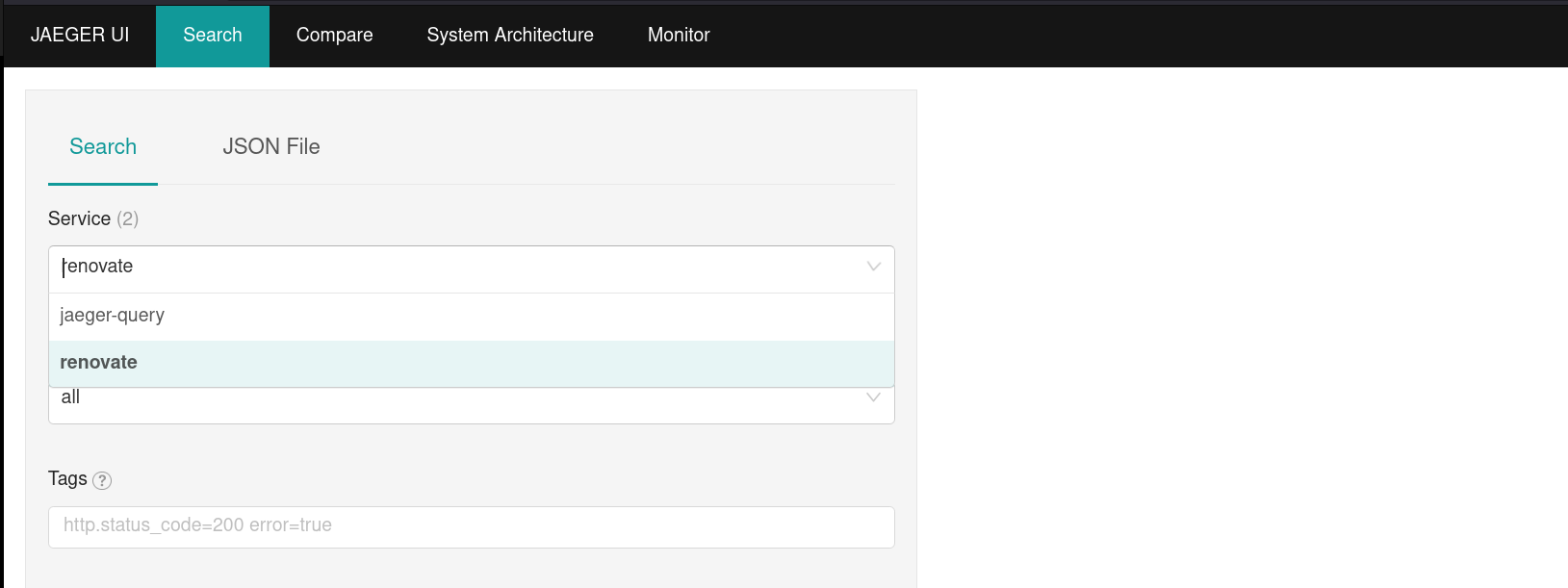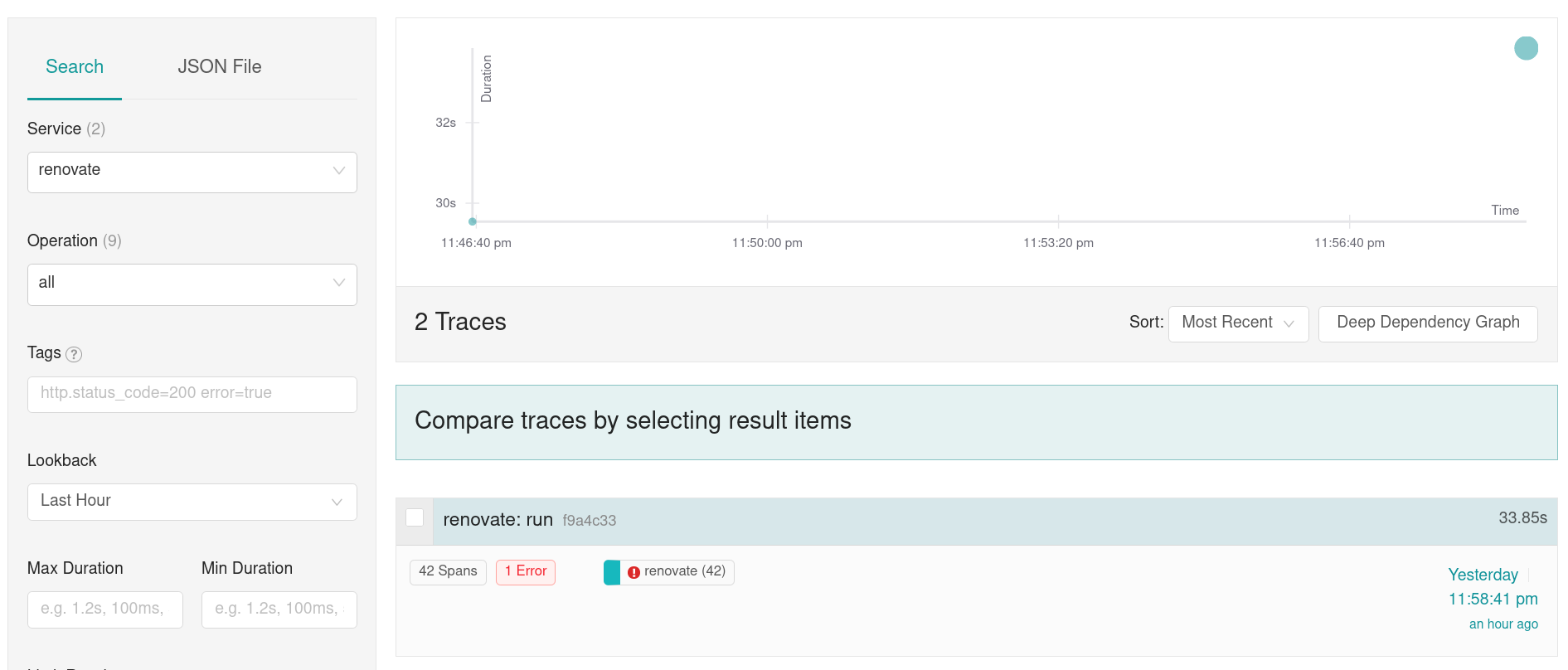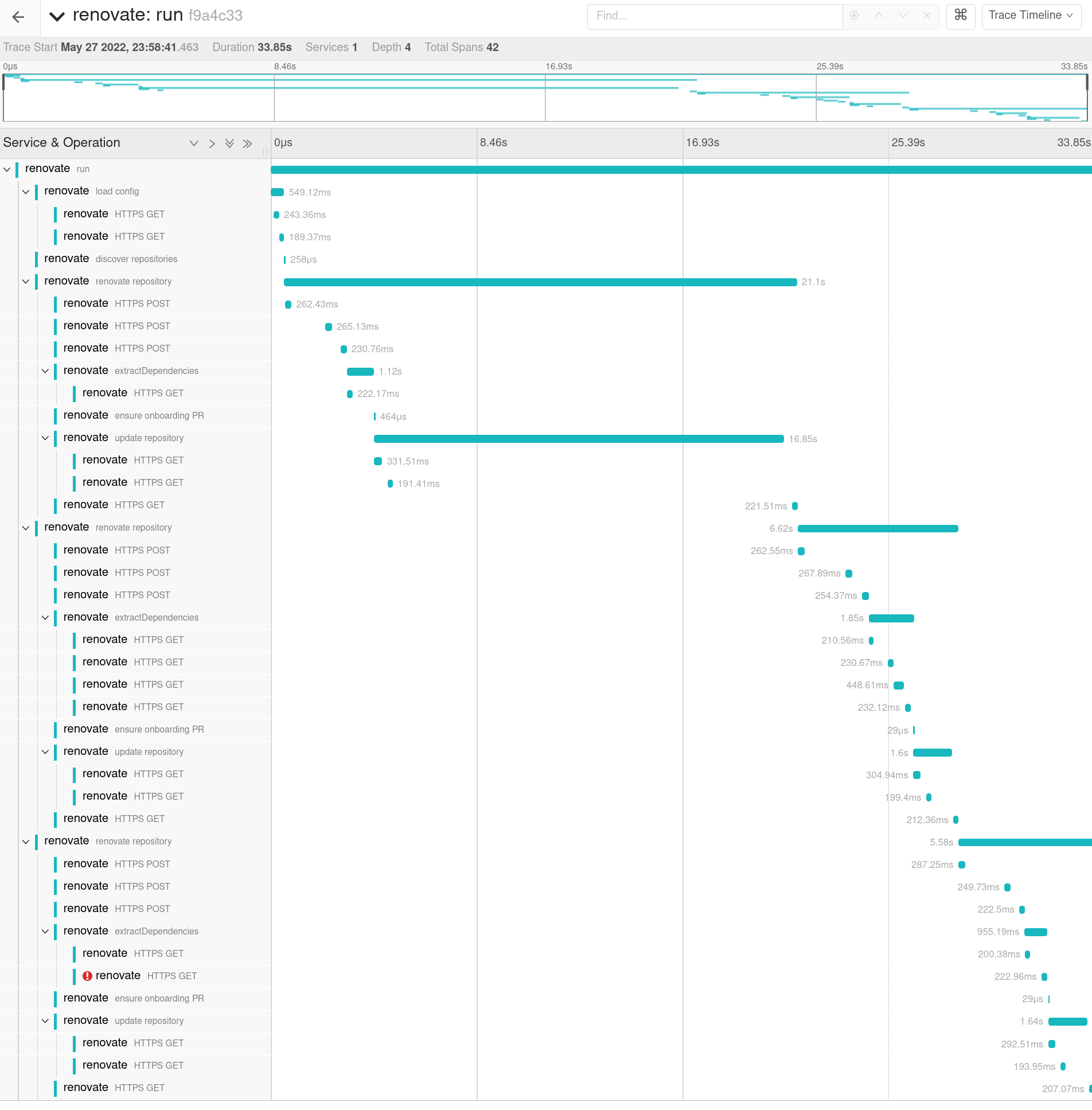9.3 KiB
OpenTelemetry
Requirements:
- docker-compose
Prepare setup
Create a docker-compose.yaml and otel-collector-config.yml file as seen below in a folder.
version: '3'
services:
# Jaeger
jaeger:
image: jaegertracing/all-in-one:1.64.0
ports:
- '16686:16686'
- '4317'
otel-collector:
image: otel/opentelemetry-collector-contrib:0.116.1
command: ['--config=/etc/otel-collector-config.yml']
volumes:
- ./otel-collector-config.yml:/etc/otel-collector-config.yml
ports:
- '1888:1888' # pprof extension
- '13133:13133' # health_check extension
- '55679:55679' # zpages extension
- '4318:4318' # OTLP HTTP
- '4317:4317' # OTLP GRPC
- '9123:9123' # Prometheus exporter
depends_on:
- jaeger
receivers:
otlp:
protocols:
grpc:
http:
exporters:
otlp/jaeger:
endpoint: jaeger:4317
tls:
insecure: true
logging:
prometheus:
endpoint: '0.0.0.0:9123'
processors:
batch:
spanmetrics:
metrics_exporter: prometheus
latency_histogram_buckets: [10ms, 100ms, 250ms, 1s, 30s, 1m, 5m]
dimensions:
- name: http.method
- name: http.status_code
- name: http.host
dimensions_cache_size: 1000
aggregation_temporality: 'AGGREGATION_TEMPORALITY_CUMULATIVE'
extensions:
health_check:
pprof:
zpages:
service:
extensions: [pprof, zpages, health_check]
pipelines:
traces:
receivers: [otlp]
exporters: [otlp/jaeger, logging]
processors: [spanmetrics, batch]
metrics:
receivers: [otlp]
exporters: [prometheus]
Start setup using this command inside the folder containing the files created in the earlier steps:
docker-compose up
This command will start an OpenTelemetry Collector and an instance of Jaeger.
Jaeger will be now reachable under http://localhost:16686.
Run Renovate with OpenTelemetry
To start Renovate with OpenTelemetry enabled run following command, after pointing to your config.js config file:
docker run \
--rm \
-e OTEL_EXPORTER_OTLP_ENDPOINT=http://localhost:4318 \
-v "/path/to/your/config.js:/usr/src/app/config.js" \
renovate/renovate:latest
You should now see trace_id and span_id fields in the logs.
INFO: Repository finished (repository=org/example)
"durationMs": 5574,
"trace_id": "f9a4c33852333fc2a0fbdc163100c987",
"span_id": "4ac1323eeaee
Traces
Open now Jaeger under http://localhost:16686.
You should now be able to pick renovate under in the field service field.
Select Find Traces to search for all Renovate traces and then select one of the found traces to open the trace view.
You should be able to see now the full trace view which shows each HTTP request and internal spans.
Metrics
Additional to the received traces some metrics are calculated. This is achieved using the spanmetricsprocessor. The previous implemented setup will produce following metrics, which are exposed under http://localhost:9123/metrics:
# HELP calls_total
# TYPE calls_total counter
### Example of internal spans
calls_total{operation="renovate repository",service_name="renovate",span_kind="SPAN_KIND_INTERNAL",status_code="STATUS_CODE_UNSET"} 3
calls_total{operation="run",service_name="renovate",span_kind="SPAN_KIND_INTERNAL",status_code="STATUS_CODE_UNSET"} 1
### Example of http calls from Renovate to external services
calls_total{http_host="api.github.com:443",http_method="POST",http_status_code="200",operation="HTTPS POST",service_name="renovate",span_kind="SPAN_KIND_CLIENT",status_code="STATUS_CODE_UNSET"} 9
...
# HELP latency
# TYPE latency histogram
### Example of internal spans
latency_bucket{operation="renovate repository",service_name="renovate",span_kind="SPAN_KIND_INTERNAL",status_code="STATUS_CODE_UNSET",le="0.1"} 0
...
latency_bucket{operation="renovate repository",service_name="renovate",span_kind="SPAN_KIND_INTERNAL",status_code="STATUS_CODE_UNSET",le="9.223372036854775e+12"} 3
latency_bucket{operation="renovate repository",service_name="renovate",span_kind="SPAN_KIND_INTERNAL",status_code="STATUS_CODE_UNSET",le="+Inf"} 3
latency_sum{operation="renovate repository",service_name="renovate",span_kind="SPAN_KIND_INTERNAL",status_code="STATUS_CODE_UNSET"} 30947.4689
latency_count{operation="renovate repository",service_name="renovate",span_kind="SPAN_KIND_INTERNAL",status_code="STATUS_CODE_UNSET"} 3
...
### Example of http calls from Renovate to external services
latency_bucket{http_host="api.github.com:443",http_method="POST",http_status_code="200",operation="HTTPS POST",service_name="renovate",span_kind="SPAN_KIND_CLIENT",status_code="STATUS_CODE_UNSET",le="0.1"} 0
...
latency_bucket{http_host="api.github.com:443",http_method="POST",http_status_code="200",operation="HTTPS POST",service_name="renovate",span_kind="SPAN_KIND_CLIENT",status_code="STATUS_CODE_UNSET",le="250"} 3
latency_bucket{http_host="api.github.com:443",http_method="POST",http_status_code="200",operation="HTTPS POST",service_name="renovate",span_kind="SPAN_KIND_CLIENT",status_code="STATUS_CODE_UNSET",le="9.223372036854775e+12"} 9
latency_bucket{http_host="api.github.com:443",http_method="POST",http_status_code="200",operation="HTTPS POST",service_name="renovate",span_kind="SPAN_KIND_CLIENT",status_code="STATUS_CODE_UNSET",le="+Inf"} 9
latency_sum{http_host="api.github.com:443",http_method="POST",http_status_code="200",operation="HTTPS POST",service_name="renovate",span_kind="SPAN_KIND_CLIENT",status_code="STATUS_CODE_UNSET"} 2306.1385999999998
latency_count{http_host="api.github.com:443",http_method="POST",http_status_code="200",operation="HTTPS POST",service_name="renovate",span_kind="SPAN_KIND_CLIENT",status_code="STATUS_CODE_UNSET"} 9
The spanmetricsprocessor creates two sets of metrics.
Calls metric
At first there are the calls_total metrics which display how often specific trace spans have been observed.
For example:
calls_total{operation="renovate repository",service_name="renovate",span_kind="SPAN_KIND_INTERNAL",status_code="STATUS_CODE_UNSET"} 3 signals that 3 repositories have been renovated.
calls_total{operation="run",service_name="renovate",span_kind="SPAN_KIND_INTERNAL",status_code="STATUS_CODE_UNSET"} 1 represents how often Renovate has been run.
If we combine this using the PrometheusQueryLanguage ( PromQL ), we can calculate the average count of repositories each Renovate run handles.
calls_total{operation="renovate repository",service_name="renovate"} / calls_total{operation="run",service_name="renovate"}
This metrics is also for spans generated by http calls:
calls_total{http_host="registry.terraform.io:443",http_method="GET",http_status_code="200",operation="HTTPS GET",service_name="renovate",span_kind="SPAN_KIND_CLIENT",status_code="STATUS_CODE_UNSET"} 5
Latency buckets
The second class of metrics exposed are the latency focused latency buckets which allow to create heatmaps.
A request is added to a backed if the latency is bigger than the bucket value (le). request_duration => le
As an example if we receive a request which need 1.533s to complete get following metrics:
latency_bucket{http_host="api.github.com:443",le="0.1"} 0
latency_bucket{http_host="api.github.com:443",le="1"} 0
latency_bucket{http_host="api.github.com:443",le="2"} 1
latency_bucket{http_host="api.github.com:443",le="6"} 1
latency_bucket{http_host="api.github.com:443",le="10"} 1
latency_bucket{http_host="api.github.com:443",le="100"} 1
latency_bucket{http_host="api.github.com:443",le="250"} 1
latency_bucket{http_host="api.github.com:443",le="9.223372036854775e+12"} 1
latency_bucket{http_host="api.github.com:443",le="+Inf"} 1
latency_sum{http_host="api.github.com:443"} 1.533
latency_count{http_host="api.github.com:443"} 1
Now we have another request which this time takes 10s to complete:
latency_bucket{http_host="api.github.com:443",le="0.1"} 0
latency_bucket{http_host="api.github.com:443",le="1"} 0
latency_bucket{http_host="api.github.com:443",le="2"} 1
latency_bucket{http_host="api.github.com:443",le="6"} 1
latency_bucket{http_host="api.github.com:443",le="10"} 2
latency_bucket{http_host="api.github.com:443",le="100"} 2
latency_bucket{http_host="api.github.com:443",le="250"} 2
latency_bucket{http_host="api.github.com:443",le="9.223372036854775e+12"} 2
latency_bucket{http_host="api.github.com:443",le="+Inf"} 2
latency_sum{http_host="api.github.com:443"} 11.533
latency_count{http_host="api.github.com:443"} 2
More about the functionality can be found on the Prometheus page for metric types.


